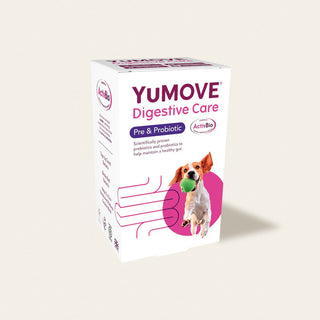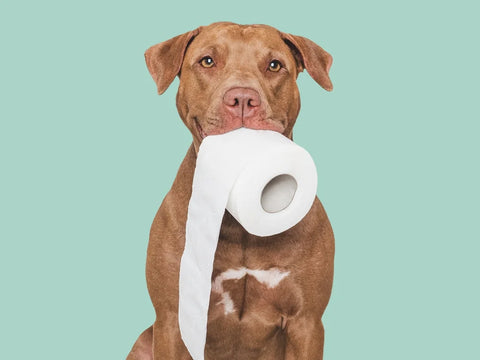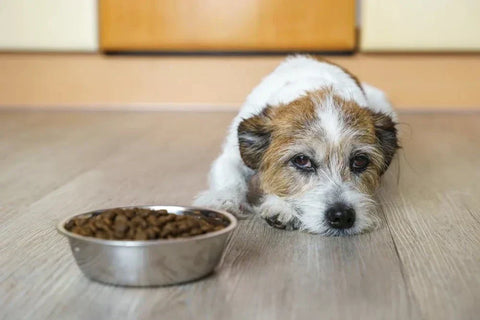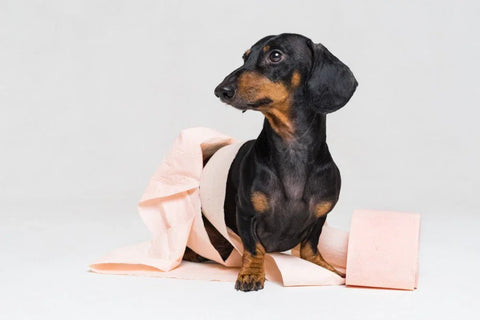
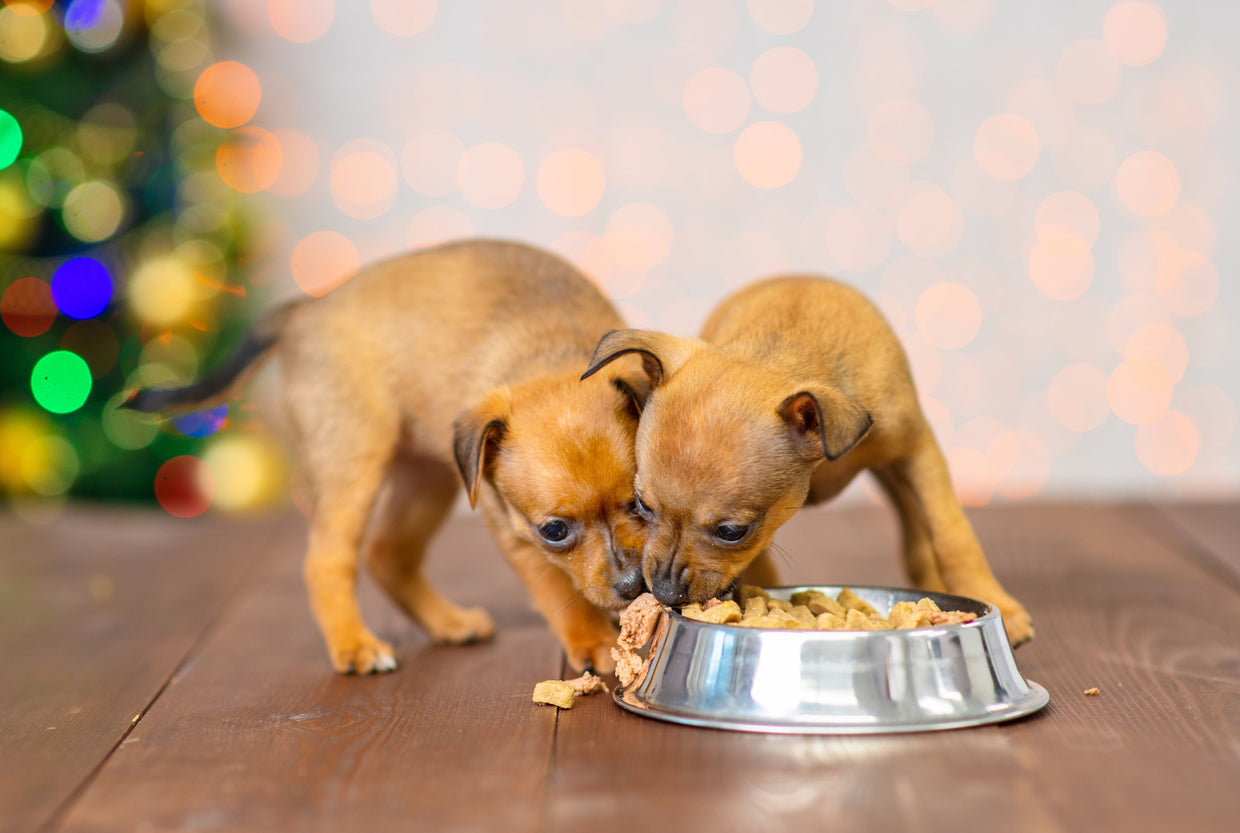
A dog’s Christmas dinner
If we’re all tucking into a delicious Christmas spread, it’s only fair that your dog gets a little upgrade, too. But keep in mind that your festive feast of roast turkey, gravy, stuffing and pigs in blankets isn’t entirely dog friendly. In fact, some things we eat are toxic to our furry friends. Read on to find out which parts of a Christmas roast your dog can and can’t eat…
The Christmas dinner

Turkey
Turkey is the centrepiece of a Christmas dinner. And you’ll be glad to know that your dog is fine to nibble on a few bite-sized pieces of white turkey (or chicken) meat. However, the rest of the bird should be off limits. The skin of a turkey and the dark meat are often too fatty for dogs’ sensitive tummies.
Cooked bones
The bone from a turkey drumstick might seem like the perfect festive snack for your dog. But actually, it can be really harmful. That’s because when bones are cooked, they become brittle. Your dog has very strong jaws, and if they bite down on bones, they become at risk of swallowing sharp shards of bone and dog choking.
Baked ham
It’s probably best to keep the glazed ham out of your dog’s reach. Not only is ham fatty, but it has an extremely high salt content. Just like you, your dog doesn’t need that much salt in their diet. While the occasional morsel of ham won’t do any harm, it can give your dog a taste for processed meat. And you don’t want your dog begging for a bite every time you tuck into a ham sandwich.
Roast potatoes
It’s undeniable that roast potatoes are one of the best parts of a Christmas dinner. But dogs should never eat anything that’s been cooked in butter, fat or oil. Which sadly means roasties are completely off limits for your dog’s festive dinner.
If you want, you can add mashed or boiled potatoes to your dog’s bowl. But make sure they’re completely plain, with no added salt or butter. And don’t overdo it. Dogs sometimes struggle with digesting potatoes which are very starchy.
Stuffing
Onions (and anything in the onion family) are one of the biggest no-nos when it comes to your dog. Everything in the allium family – garlic, onions, leeks, shallots and chives, to name a few – contain a compound that can cause anaemia in dogs. The same goes for garlic and onion powder. Unfortunately, this means stuffing is off the table. Or rather, stuffing should stay on the table, and not in your dog’s food bowl. We advise you seek veterinary advice immediately if any of the allium family are eaten.
Pigs in blankets
For us, pigs in blankets are the star of the Christmas show. And that’s why it’s so heartbreaking to say that your dog shouldn’t eat any. Pigs in blankets – especially shop-bought ones – are far too salty and fatty for dogs. If you’re buying your pork from the butchers, opt for lean meat. This way, you can get away with feeding a few to your dog.
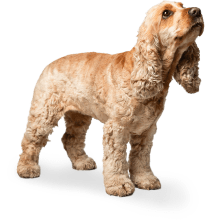
Cranberry sauce
In small quantities, cranberry sauce is safe for dogs. But only if it’s pure cranberry sauce with nothing added to it, such as sweeteners, grapes, raisins or nuts.
Yorkshire puddings
There are no ingredients in Yorkshire puddings that are dangerous for dogs, however, as homemade Yorkshires are cooked in lots of oil, they're best avoided.
Gravy
Your dog is likely to lap up as much gravy as they can, because it tastes utterly irresistible to them. However, it can cause an upset stomach due to its high fat and salt content. Instead, give them the sense of Christmas with a gravy dog food – it’s basically the same thing, just healthier for dogs!
Christmas vegetables
There are a lot of vegetables you can add to your dog’s dinner. Brussel sprouts, carrots, red cabbage, parsnips, green beans and peas can all make a scrummy snack. Treat your dog to some raw vegetables as you prepare your festive lunch. You can also add some cooked vegetables to their dinner bowl. But make sure they haven’t been baked in butter, oil or herbs and spices.
Like all human food, you should take it easy with the seasonal veggies. Although they’re fine for your dog to eat, too much can cause bad wind and smelly breath, and sometimes diarrhoea.
Your dog’s Christmas Day breakfast

Nothing beats the feeling of waking up on Christmas morning – especially when you’ve got a tasty festive breakfast waiting for you. But what about your dog? How can you make their mood merrier first thing in the morning?
Eggs
In many houses, cooked eggs are a Christmas morning staple. And luckily for them, eggs can be fed to your dog as well. Cook up an extra one for your canine companion, as they’re a great source of protein and vitamins. But, of course, don’t add milk, butter or salt to your dog’s eggs.
Salmon
Eggs and salmon go hand-in-hand. But for your dog, smoked salmon is a big no-no. It can contain bacteria and parasites that are dangerous for your dog. Plus, it can contain tiny little bones that can get lodged in your dog’s throat – especially if your dog is small.
Fruit
Apples, bananas, blueberries and raspberries all top the list of fruits that your dog can eat. But sometimes fruit is high in sugar so try not to give them too much. And always remove any stones, pips or stalks before feeding to your dog.
Paw-secco
Is it even Christmas without a morning Buck’s Fizz? We say no. And now your dog doesn’t need to be left behind when it comes to the morning bubblies. Pawsecco is a non-alcoholic, non-sparking and completely natural herbal drink for dogs. You can pour it over their Christmas dinner, or serve it straight as a festive tipple. Because who wouldn’t want to raise a glass with their furry family member?
Not-so-festive puddings

Christmas dinner without mountains upon mountains of desserts just wouldn’t be the same, would it? But most of our sweet treats are far too sugary and fatty for our furry friends – which means trifles, tarts and cakes should be off their menu. And some puddings can be poisonous to your pup, such as ones that contain nuts.
Christmas pudding, mince pies and Christmas cake
Aside from being full of fat, these Christmas desserts often contain raisins, currants and sultanas, which are very toxic to dogs. They also contain spices and alcohol which are harmful, too. If your dog eats any of these, we recommend seeking the advice of your vet immediately.
Chocolate
Chocolate is an all-year-round danger to your dog. But during the festive season, there’s often an abundance of chocolate in the home. Smaller dogs are more at risk, as it takes smaller amounts to do harm.
Xylitol
You might not have heard of it, but this sweetener is used as a substitute for sugar in many chocolates, sweets and baked goods. Xylitol is extremely dangerous to dogs as it can cause a drop in blood sugar levels, making it a definite no-no.
What sweet treats can dogs eat?
At Christmas time, we all deserve a treat – and that goes for our our canine companions too. Why not try baking them something special this festive season? Take a look at five tasty dog treats inspired by the Great British Bake Off. We can guarantee these bakes will get your dog’s tail wagging!
What to give your dog instead of human food
Don’t want to feed your dog scraps, but still want to make them feel festive? Here are a few of our favourite tips to get them in the Christmas spirit:
- Give them the gift of a new toy. Presents are a great way to get your pup involved on Christmas Day, without having to feed them potentially poisonous foods. The best part? A new toy will last much longer than some seasonal snacks. You could also try re-introducing your dog to an old toy that they’ve forgotten about. Give them a quick wash, and they’ll be as good as new!
- Dish up a treat. To make their day extra special, you could serve up your dog’s regular food in a festive bowl.
- Add some puzzles to playtime. Mental stimulation is so important for dogs. And puzzles can engage your dog’s brain and keep them occupied for hours.
- Spend time with them. Speaking of playtime, dogs love spending time with us. Extra playtime will seem like a big treat in your dog’s eyes. If they keep pestering you while you’re preparing the Christmas dinner, get another family member to distract them with games.
- Take a new route in your walkies. Or, opt for one that’s slightly different than the norm. This way, they can enjoy new sights and smells. And it’s a great way of keeping them active during the chillier months!
- Give them a new flavour of food. It’s likely that dogs don’t even know it’s Christmas, so they don’t know that they’re missing out on a festive feast. Instead, give them something special by switching up the flavour of their dog food on the big day.
Digestive supplements for sensitive tummies
Keep some YuMOVE probiotics for dogs tablets to hand in case you feel your dog could use some extra digestive support this festive season. YuMOVE Digestive Care contains a unique blend of prebiotics and probiotic bacteria and works by keeping stools firm, reducing wind and increasing 'good' bacteria in the gut. YuMOVE Digestive Care PLUS is our higher strength version, and it provides faster support for your dog’s digestion.
Christmas truly is the most wonderful time of the year, and there’s no reason why your dog can’t enjoy it just as much as you. Although there are lots of things that dogs can’t eat, there’s still plenty of other treats and toys you can surprise them with.
Want some more practical guidance? Learn how to keep your dog safe at Christmas. Or, if you’d rather read something fun that’ll give you that festive feeling, find out what Christmas day looks like from your dog’s perspective.
